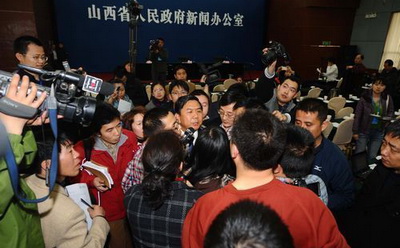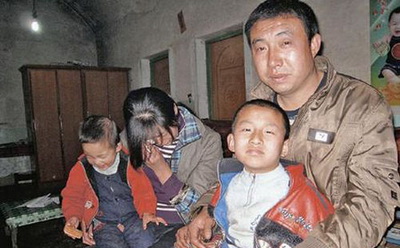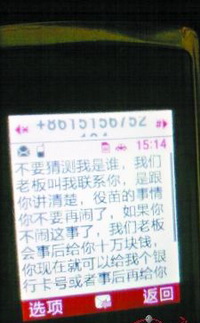Shanxi Immunization Scandal Pits State-owned Media Against Local Government

The China Economic Times, a financial newspaper published by the Development Research Center, a think tank under the authority of the country's State Council, first published its expose of alleged irregularities and safety concerns plaguing Shanxi province's immunization program on March 17.
Since then, the allegations of children dying or becoming ill due to receiving poor quality vaccines in addition to accusations of administrative incompetence and corruption outlined in the report, although officially denied, have snowballed to become the latest in a series of national scandals involving children's health
Written by Wang Keqin, the series of six reports published by The China Economic Times (CET) is an in-depth expose of the problems plaguing Shanxi's immunization system and was published after the paper had completed an extensive investigation into the matter.
The report alleges that 4 children have died and another 78 children are now suffering from epilepsy, viral encephalitis and other diseases after receiving vaccines provided by the Huawei Shidai Company (北京华卫时代医药生物技术有限公司) on behalf of the province’s Disease Prevention and Control Center.
The report also reveals that Huaiwei Shidai, which presented itself as a company operating under the authority of the Ministry of Health, is in fact a private company founded by three individuals in Beijing.
The chairman of Huaiwei Shidai, an employee of the Association of Health Industry and Enterprise Management, called Tian Jianguo, owns 80 percent of the company's stocks.
The CET report also accuses the former director of Shanxi's Disease Prevention and Control Center, Li Wenyuan, of illegally using 270,000 yuan of the 500,000 yuan that Huaiwei Shidai deposited when they first signed the contract with the provincial center, to purchase a car for his private use.
The same official is also accused of not strictly adhering to regulations during the tendering of the contract to oversee the province's immunization program, which was eventually awarded to Huaiwei Shidai in 2006.
The report further alleges that Tian Jianguo abused his position as chairman of Huaiwei Shidai to ensure that vaccines produced by his various companies were used throughout Shanxi, and by doing so, gained huge profits.
It's also alleged that the company began charging citizens for vaccines that should have been administered for free and raising the prices of various vaccines.
The report quotes Chen Tao'an, the former director of Shanxi's Disease Prevention and Control Center Information Center, as saying that the vaccines provided by Huawei Shidai had been exposed to high temperatures before they were distributed to villages, towns and cities across the province.
According to the CET report, Shanxi residents were exposed to these damaged and unsafe vaccines as recently as March 2009. 
Shanxi's provincial health bureau's first response to the report appeared on the evening of March 17 when Xinhua News Agency carried a story quoting an unnamed official connected to the provincial health bureau as saying that the allegations are "basically untrue".
The following day, The China Economic Times published an announcement on their website stating that they "stand by all the facts written in the report," and expressed strong dissatisfaction with the remarks made by the Shanxi Provincial Health Bureau.
On March 21, the central Ministry of Health sent a team of eight experts to the province to investigate the allegations made by the newspaper, the team intends to focus its attention on the cases of the infants mentioned in the CET reports.
During a press conference organized by the Shanxi government press office in the provincial capital of Taiyuan on March 22, local officials admitted that Huawei Shidai had not passed through a strict tendering process before being awarded the contract to take control of immunization in the province.
Ju Xianhua, deputy secretary general of the provincial government, revealed that the former director of the provincial Disease Prevention and Control Center, Li Wenyuan, violated rules while cooperating with Huawei Shidai.  However, officials continued to insist "the quality of the vaccines being used in Shanxi is guaranteed and people can continue to be inoculated safely," while urging the media to "patiently wait for the final result".
However, officials continued to insist "the quality of the vaccines being used in Shanxi is guaranteed and people can continue to be inoculated safely," while urging the media to "patiently wait for the final result".
Media commentator Yang Tao has expressed doubts that the investigation team appointed by the Ministry of Health will achieve anything; in an article published on The Economic Observer website, he argues that the investigation will be "futile" because the team is only "playing an assistant role in the investigation".
According to media reports published yesterday, Chen Tao'an and parents of some of the children affected by the immunization scandal received threatening SMS messages earlier this week. The messages not only threatened the families of the victims with violence but also suggested that they could earn 50,000 to 100,000 yuan if they kept quiet.
Links and Sources:
First Part of Original China Economic Times Report: 近百孩子不明病因致死致残 (Chinese)
Follow Up Report on China Economic Times: 山西通报疫苗事件调查情况 (Chinese)
Xinhua News Agency: 山西卫生厅:近百儿童注射疫苗或死或残报道不实 (Chinese)
China Economic Times: 中国经济时报关于“山西疫苗乱象调查”报道的声明 (Chinese)
Ministry of Health: 卫生部派出8人专家组赴山西指导调查 (Chinese)
CRI: March 22 Press Conference (Chinese)
Economic Observer: 疫苗门”黑幕须最高司法机关揭开 (Chinese)
CRI: Image
Netease: Special Report on the Shanxi Immunization Case (Chinese)
CCTV: Report on threatening messages (Chinese)
The views posted here belong to the commentor, and are not representative of the Economic Observer |
















